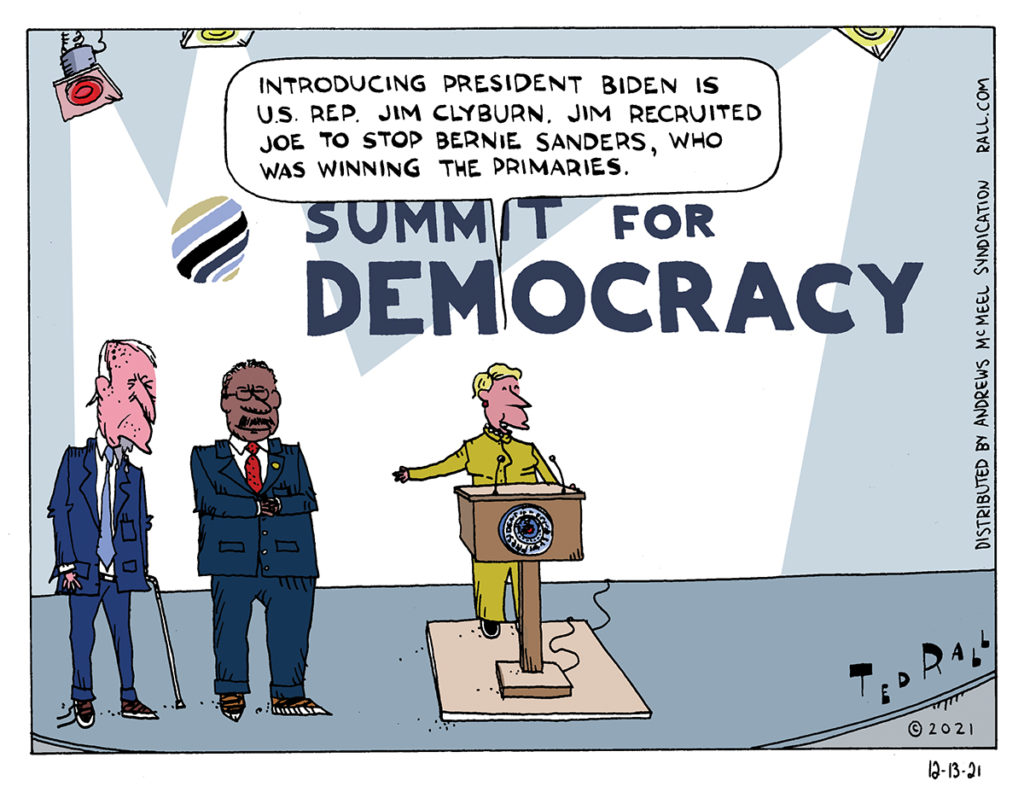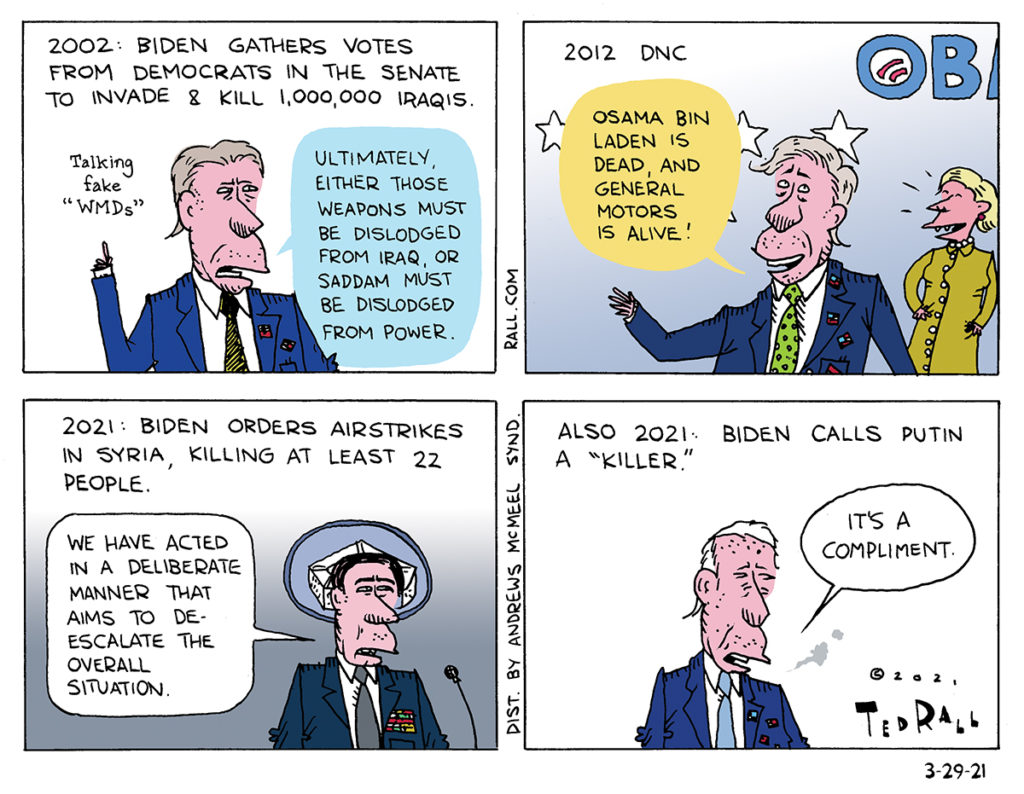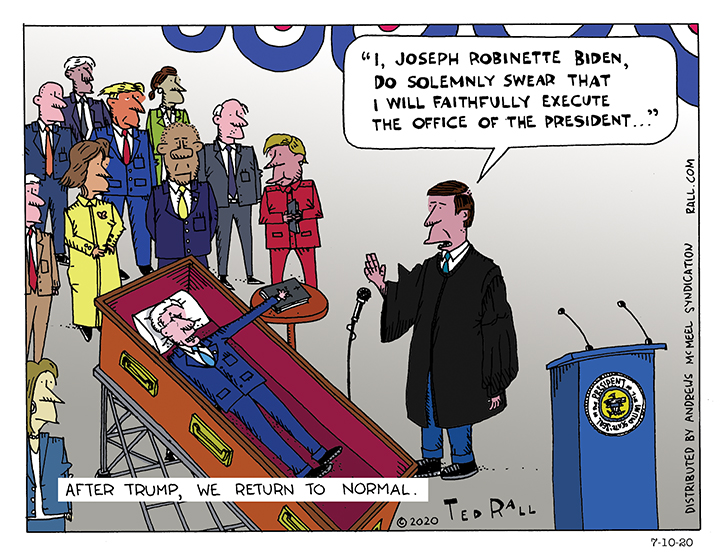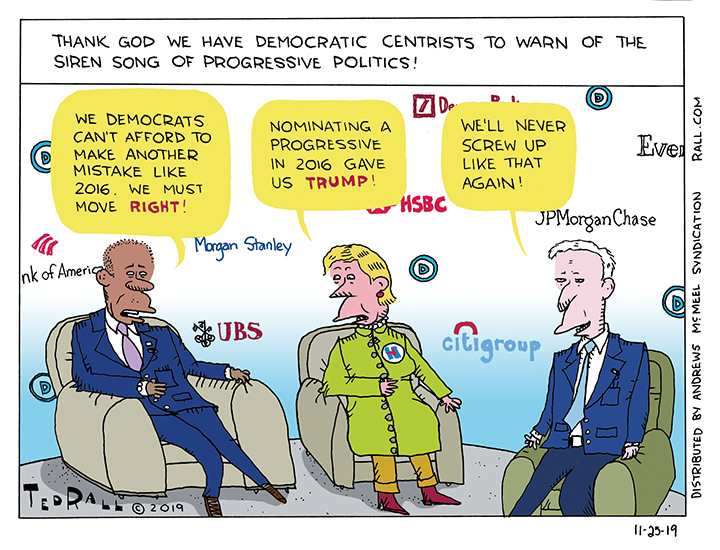The irony is always palpable when the United States lectures the world about democracy, as Joe Biden is currently doing with his Summit for Democracy. How does invading sovereign states, interfering with elections and propping up dictatorships play into that? Not to mention the fact that our own president isn’t truly democratically elected.
The Democratic Centrist-Progressive Alliance Hinges Upon Build Back Better
“At a certain point, we have to trust one another,” Representative Peter Welch (D-VT), said as he left a meeting of the Progressive Caucus meeting. Progressives had just acquiesced to President Joe Biden’s pleas that left-leaning House members sign off on the $1 trillion infrastructure spending bill they’d been holding up in order to pressure the chamber’s centrists to support their own $1.75 trillion package of social programs.
The progressive bloc extracted a written promise from five key centrists to vote for the Build Back Better bill assuming that the Congressional Budget Office verifies the math behind the spending.
The question grassroots progressives are asking themselves is: is trust wise? Will the corporatists deliver? Or are we just rubes who about to get rolled again?
The immediate electoral viability of the Democratic Party depends on the answer.
Progressive voters and activists who form the ideological base of the party and provide most of its energy believe they have long been taken for granted by the Democrats’ dominant, minority, corporatist ruling elite. Their long-simmering resentments boiled into explosive rage after the insulting and, they believe, corrupt manner Bernie Sanders and his supporters were treated by the DNC and its blackout-enforcing media allies throughout his 2016 primary challenge to Hillary Clinton and during the Democratic National Convention.
Clinton’s campaign openly courted anti-Trump Republicans in the general election campaign, telling progressive Democrats she didn’t need them to win. Millions of them took her at her word, sitting on their hands on election day, handing the presidency to Donald Trump.
Then the defeated centrists had the nerve to blame progressives for not voting.
Incited by anti-Trump fever, left populists turned out for Joe Biden in 2020. But they did so reluctantly, doubly so after that year’s primary process featured yet another overt DNC operation to derail Sanders. The Vermont senator’s early primary surge crashed the night before Super Tuesday, when sleazy southern party boss James Clyburn orchestrated simultaneous endorsements of Biden by former rivals Amy Klobuchar, Pete Buttigieg and Beto O’Rourke, an establishment favorite who entered late after being recruited by DNC insiders in order to stop Sanders.
Biden ran as the anti-Trump, nothing more. He didn’t campaign on—and therefore can’t claim a mandate for—ambitious infrastructure and social spending measures, which were only conceived after taking office in order to heal his rift with his party’s progressive wing. As anyone who has been near a news source over the last six months knows, the president has had a difficult time convincing right-leaning Democrats like Kyrsten Sinema of Arizona and Joe Manchin of West Virginia to play ball. Separating the spending packages into the relatively easy-to-pass infrastructure and the challenging social program bills was an inelegant, consummately inside-the-Beltway solution that may be about to blow up in the Democrats’ faces.
Several things could go wrong for Democrats.
The White House promises that Build Back Better is 100% revenue-neutral and therefore won’t increase the deficit. The five moderate holdouts who signed the House letter say their support is contingent on the CBO confirming that claim. But the CBO already determined that the infrastructure bill by itself would increase the deficit by $256 billion. One of the more generous assessments of Build Back Better, by Ohio Republican Senator Rob Portman, found that it would add $100 billion to the Treasury. That still leaves an overall shortfall big enough for the five congresspersons to justify backing out.
Assuming it survives, Build Back Better goes to the Senate where the infamous parliamentarian will rule on what bits and pieces of legislation are permitted in the reconciliation process. Will progressives still be happy with what’s left? Will Manchin and Sinema drop their long-standing objections?
Then, assuming it gets through the Senate — which seems like a long shot at this point — changes have to be reconciled between the House and Senate versions.
Progressive voters aren’t going to be happy unless the lion’s share of what’s currently in Build Back Better gets signed into law by President Biden. If the results are significantly watered-down or, still worse, nonexistent, hell has no wrath to compare with the rage of progressives who have long had it with the Democratic Party.
Their sense of betrayal will be boundless. They will be furious at themselves for having been so gullible as to have trusted the perfidious centrists who repeatedly screwed them over. And enough of them will be anywhere but at the polls on election days 2022 and 2024 to make all the difference.
(Ted Rall (Twitter: @tedrall), the political cartoonist, columnist and graphic novelist, is the author of a new graphic novel about a journalist gone bad, “The Stringer.” Order one today. You can support Ted’s hard-hitting political cartoons and columns and see his work first by sponsoring his work on Patreon.)
Joe Biden’s Vice Presidential Pick is…ZZZZZ
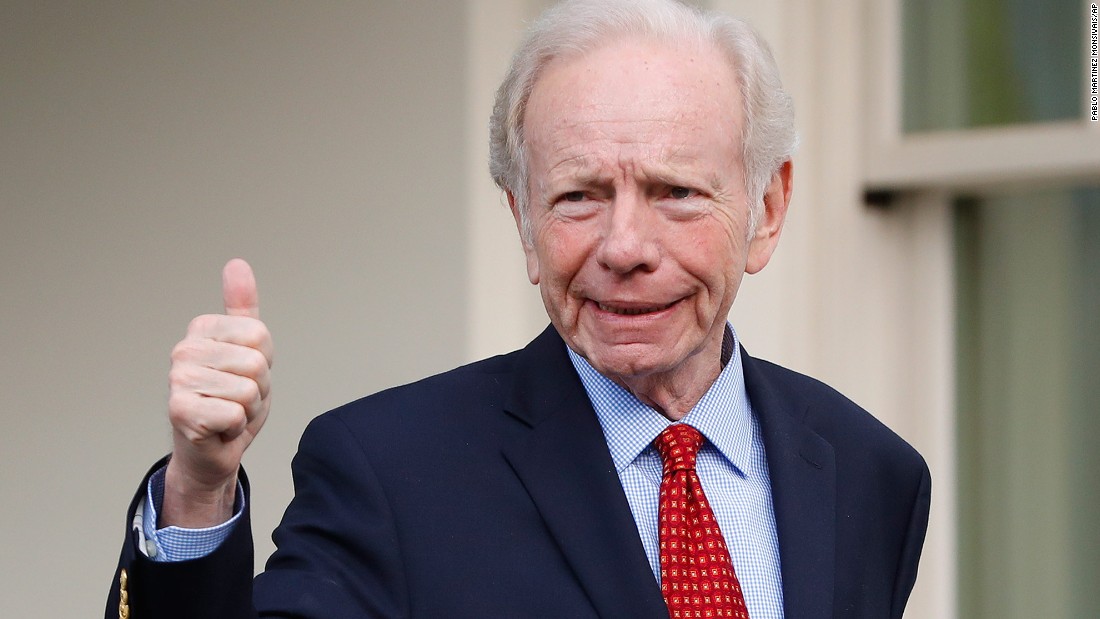
Added 6 pm Eastern 8/11/20: Well, that turned out to be true.
Most years, the Super Bowl is a dud. Yet the hype machine keeps pulling in new suckers.
The quadrennial announcement of the Democratic nomination for vice president features an identical Lucy, Charlie Brown and the football dynamic: lots of hype followed by deadly disappointment. And there’s never been more hype than this year.
Not that Joe Biden’s pick isn’t important. If he wins, he will be the oldest person to take the oath of office by a full eight years. (He’ll be 78. Trump, the second oldest, was 70 in 2017.) Even by the standards that the 70s are the new 60s, Joe Biden’s 70s look more like 80s or 90s. His choice has to satisfy several competing constituencies: women, Blacks, and the progressive voters he desperately needs to show up November 3rd instead of sitting on their hands as they did last time.
But past performance almost always being a reliable indicator of near-future returns, Democrats should prepare for a Super Bowl-like fiesta of deep disappointment.
Last cycle’s brutal primaries prompted speculation that Hillary Clinton might unify the party by giving Bernie Sanders the VP nod. She chose Tim Kaine. (Political pundits jammed phone and text messaging with: “who?”) She told Charlie Rose she loved that Kaine described himself as “too boring.”
Clinton thought Kaine’s dullness would provide balance. Voters considered it redundant. “‘Safe,’” observed Politico, “seems to be Kaine’s middle name.” In the year of Trump, safe was anything but.
That’s often the case.
I was traveling through Central Asia when a hotel employee informed me that Al Gore had announced that Connecticut senator Joe Lieberman would be his running mate to go up against Bush-Cheney in 2000. I assumed my Uzbek host was part of some weird post-Soviet gaslighting campaign. How could Gore do anything so stupid?
The mists of time and the Florida recount fiasco have blurred the fact that, like Clinton 16 years later, Gore needed a progressive to balance his record as a Third Way centrist. Inexplicably, both at the time and today, clueless Democratic pollsters somehow convinced themselves that what he really needed to do was distance himself from Bill Clinton—the president under whom he’d served for eight years and who was enjoying improving poll numbers. They also thought the conservative Lieberman’s “moral rectitude” in being the first Democrat to condemn Bill Clinton for the Monica Lewinsky scandal would appeal to left-leaning Ralph Nader voters.
Lieberman opposed affirmative action and gay marriage. He supported every major military intervention, including, at first, Vietnam.
Nader kept his progressive votes.
The first rule of picking a veep is do no harm. The second is to remember the lesson of Bill Clinton/Al Gore 1992, when Democrats won with a pair of centrists of similar age and temperament from neighboring states: geographical ticket balancing as an art peaked out when JFK tapped LBJ.
As tensions mount between voters dominated by the populist progressive left and party leaders who manipulate the Democrats’ primary process to favor corporate centrists like Obama, Clinton and Biden, however, the case for ideological balance seems stronger than ever. Surely Hillary Clinton must wake up in the middle of the night wondering if relegating Bernie Sanders to number 39 on her list of running mates was the best decision she ever made.
By that standard Elizabeth Warren ought to be keeping her phone by the window in her house with the best reception. She would be an interesting choice: both more intelligent and intellectual than her boss, white (OK, white and Native American) in the year of Black Lives Matter, someone disgruntled progressives would have a hard time justifying as the target of a voter boycott.
Of the women floating around on Biden’s supposed short list, Warren would surprise. She would exceed expectations. She might unify the party.
I don’t think she stands much of a chance.
Boring usually gets the nod.
(Ted Rall (Twitter: @tedrall), the political cartoonist, columnist and graphic novelist, is the author of the biography “Political Suicide: The Fight for the Soul of the Democratic Party.” You can support Ted’s hard-hitting political cartoons and columns and see his work first by sponsoring his work on Patreon.)
It Could Easily Happen Here, Soon

You don’t want to lose your job. How would you feel if getting fired would mean that you would spend the rest of your life in prison? You would do anything to keep working.
Anything.
That’s the position in which Donald Trump finds himself.
The president is the target of a myriad of congressional, state and federal investigations into his business practices. Trump could resign in exchange for a deal with Mike Pence to pardon him as Ford did for Nixon, or hope for a victorious Joe Biden to do the same in the spirit of looking forward, not backward.
But a presidential pardon wouldn’t apply to the biggest threat to Trump’s freedom: the New York-based inquiries by the U.S. attorney for the Southern District of New York, New York’s attorney general and the Manhattan D.A.’s office into hush payments that former Trump lawyer Michael Cohen made to Playboy model Karen McDougal and the adult-film actor Stormy Daniels, violations of the Constitution’s emoluments clause and into Trump’s business practices in general.
It’s highly unlikely that, as long as he continues to reside at 1600 Pennsylvania Avenue, Trump will be frog-marched into a police van. Many legal experts argue that presidents enjoy at least temporary immunity from prosecution. Department of Justice memos dating to 1973 state that, as a matter of policy though not law, a sitting president should not be indicted.
If Joe Biden maintains his double-digit lead in the polls, however, Trump stands to lose his executive immunity from prosecution early next year. At age 74, even a five-year prison term could effectively become a life sentence. What would Trump be willing to do to avoid that?
In the back (not all the way back) of Trump’s mind has to be the possibility of canceling the election.
There has been speculation, from such notables as Hillary Clinton, that Trump might refuse to leave the White House if he loses to Biden. Indeed, Trump has fed rumors that he plans to discredit the results in case of a loss. He says mail-in balloting would be plagued by fraud and foreign interference and refuses to commit to accepting the results. If I were the president, I would reject this option. Refusing to leave would be far from certain to allow him to remain in office more than a few weeks or months.
Another crisis scenario making the rounds has Republican governors loyal to Trump refusing to certify the results in their states. Under one of the more arcane sections of the Constitution the final result would be determined by the House of Representatives under a one state delegation–one vote scheme. Most states are majority Republican so Trump would probably win. Trump shouldn’t go with this plan either. Relying on feckless governors in the House of Representatives process would leave too much to chance.
Only one approach comes close to guaranteeing that Trump remains at the helm for the foreseeable future and thus out of the clutches of New York prosecutors: canceling the election entirely.
On or about November 1st, he takes to the airwaves.
“My fellow Americans,” he intones, “we are a time of unprecedented crisis. We are deep in the dreaded second wave of the coronavirus. It would be reckless and irresponsible to ask people to go outside and stand in line, risking death, in order to cast a vote that can easily be cast next year, after we have a vaccine. Moreover, the streets of many of our cities have been overrun by rioters and looters. We can’t have an election without law and order. Therefore, we will delay the vote until our safety can be guaranteed. God bless America.”
Never mind that the riots will have been provoked by Trump’s own federal government goons, the so-called Federal Protective Service, or that the pandemic will be raging because of his own incompetence, denial and inaction. His argument will ring true with his Republican base and a few moderates. As usual, Democrats will be stunned, clueless and impotent.
Trump has set the stage for a too-dangerous-to-vote argument.
Black Lives Matters protests were winding down before he sent FPS to Portland and Seattle. Thanks to these violent agents provocateurs the crowds of angry protesters are growing, buildings are burning and people are getting killed. He wants to send thugs to Chicago and other cities as well. By October they could be all over the country, spreading chaos.
After downplaying the threat of COVID-19 for months, the president has radically reversed course. He is wearing a mask in public, urging others to do so and resuming coronavirus-themed press briefings, replacing public health officials as the face of the crisis response. The new messaging: COVID is deadly. Mail-in ballots, the social-distancing alternative to IRL voting, has been discredited by the GOP; anyway, it’s too late to implement it now. Just watch: he may call for schools to remain closed, another switch.
There is no legal mechanism for canceling a federal election. The Supreme Court can’t do it. There are no exceptions, not even for nuclear war. The U.S. system will have broken down.
What will happen next? We have seen it many times in many other countries. Trump and his associates will not be able to allow the media to talk, the courts to rule or the politicians to criticize his coup.
Trump, former president and now dictator, will censor and suppress dissent to protect his regime. Martial law will be declared. Media outlets, including social media online, will be seized and censored. Lists of potential critics and opponents—leading Democrats, academics, intellectuals, pundits, even political cartoonists—will be drawn up. Those on the list will be arrested, or worse.
They say it—fascism, authoritarianism—can’t happen here. But if you’re Donald Trump and you think you’re about to lose and go to prison, what other option do you have?
(Ted Rall (Twitter: @tedrall), the political cartoonist, columnist and graphic novelist, is the author of the biography “Political Suicide: The Fight for the Soul of the Democratic Party.” You can support Ted’s hard-hitting political cartoons and columns and see his work first by sponsoring his work on Patreon.)
Corporate Crap That Doesn’t Kill Bernie Just Makes Him Stronger

On January 19th the New York Times oddly co-endorsed Senators Elizabeth Warren and Amy Klobuchar for the Democratic presidential nomination. Two days later, the key New Hampshire primary showed Warren down four points. Bernie Sanders’ surge continued. What happened?
To the extent that they ever did, the editorial boards at corporate-owned media outlets no longer seem to be helping the candidates they support. But I think it goes further than that. In a Democratic Party increasingly dominated by insurgent progressives, authenticity (or the perception thereof) is a politician’s most valuable asset. The approval of “mainstream” establishment entities has become a curse. The imprimatur of an officialdom widely seen as hopelessly corrupt dilutes a candidate’s reputation for authenticity, independence and the voters’ belief that he or she will stand up for we the people over the powers that be.
Much to the frustration of ruling elites, Bernie Sanders keeps gaining support despite repeated attempts to sandbag him. It began, of course, with a well-documented campaign by the Democratic National Committee to cheat Sanders out of a fair shot at the nomination in 2016. Though less brazen, the sympathies of the DNC, still dominated by Hillary Clinton allies, remain evident in the current cycle. As in 2016, Democratic-aligned media outlets rarely mention Sanders other than to frame him as an elderly fringe wacko. The “Bernie Blackout,” featuring graphics of TV polls where Sanders’ name had been excised, became so ridiculously obvious that it got its own Reddit.
The last few weeks have been especially instructive. There was the infamous sandbagging of Bernie Sanders at the hands of a CNN moderator. “Have you stopped beating your wife?” became, seconds after Sanders issued a categorical denial, “why did you tell Elizabeth Warren that you did not believe that a woman could win the election?,” a statement that wouldn’t be sexist if he said it and that runs counter to everything he has said and done over the last 40 years.
Next came the bizarre New York Times two-fer endorsement of Warren and Klobuchar, which included the demonstrably false claims that Bernie Sanders is hard to work with in the Senate and refuses to compromise. This was quickly followed by the news that Hillary Clinton, the nation’s least popular political figure, told a Hulu documentarian that “nobody likes” Sanders, the most popular, and that he’s a “career politician.” As opposed to herself and her husband?
In the bubble-wrapped imaginations of ruling elites like Clinton and the editors of the New York Times, the hoi polloi care deeply about what they say and think. They think we take their lead.
Reality is quite opposite.
It’s not that we don’t listen. We do. We pay attention to what Those In Charge say and what they want us to do—so that we can do the exact opposite.
Contempt for our “leaders” is one of the key reasons Donald Trump won the presidency. “To the extent that people are using Trump as a way of venting about their general unhappiness, trust is irrelevant,” Stanford University political scientist Morris Fiorina observed during the summer of 2016. “They’re just trying to send a message that they’re tired of being taken for granted and screwed by both sides.”
People wanted to send another message, albeit a childish one, to the elites: we hate you. 14% of Americans have a “great deal” of confidence in the news media. Congress’ approval rating is 27%. Last time Gallup bothered to check, Hillary was at 38%.
Americans’ disdain for their masters was placed in sharp relief by polls that showed that many Trump voters would have voted for Bernie Sanders had he been the Democratic nominee and that one out of ten Bernie Sanders’ primary supporters ended up voting for Donald Trump in the general election. Trump and Sanders were the change candidates in a change year. And 2020 is even changier.
We are witnessing political jiu-jitsu. The more viciously that neoliberals attack Bernie Sanders, the higher progressive estimations of Sanders’ authenticity rises.
Many on the left, me included, have held doubts about Bernie Sanders. We worry that he isn’t far left enough, especially on foreign policy. After all, he’s OK with drone assassinations, was pretty much silent about the Israeli invasion of Gaza, praised the illegal assassination of Osama bin Laden that denied justice to 9/11 victims, and has not proposed specific numbers by which he would cut the Pentagon budget.
Even on domestic issues, Sanders’ forte, he is weaker than we would like. The $15-an-hour minimum wage he is pushing for now would have been OK when he started working on it years ago, but due to inflation $20 or $25 an hour would make more sense now. By global standards, Sanders is no radical. He’s a garden-variety liberal—the Democratic Party under FDR.
Fortunately for him, reactionary goons like the New York Times remind us that whatever his shortcomings Sanders is still the best game in this very right-wing town, the farthest left Democrat to have presented himself for our consideration in the last 40 years.
If Hillary Clinton and CNN and MSNBC hate Bernie so much, maybe he’s all right.
It is increasingly likely that Bernie Sanders will become the Democratic nominee and perhaps President of the United States. If and when that happens, when this “democratic socialist” takes the oath of office, he ought to give a shout-out to the clueless enemies who made his victory possible.
(Ted Rall (Twitter: @tedrall), the political cartoonist, columnist and graphic novelist, is the author of “Francis: The People’s Pope.” You can support Ted’s hard-hitting political cartoons and columns and see his work first by sponsoring his work on Patreon.)

